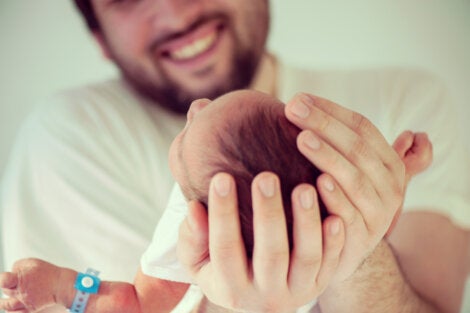Becoming a Father Can Trigger Hormonal Changes

Becoming a father is a very intense experience for some men. So much so that some dads experience a similar situation to what women experience when they become mothers. Several studies show that fathers can also undergo physiological changes.
The studies found that, on a biological level, men come into the world with the tools that enable them to be fathers and enjoy the experience. Thus, the fact that some aren’t very involved in raising their children is more related to cultural factors.
Just as being a mother means different things to different women, men have a broad range of experiences when it comes to fatherhood. What we know for sure is that nature gives both men and women what they need for parenthood to be meaningful and gratifying.
“Becoming a father, I think it inevitably changes your perspective of life. I don’t get nearly enough sleep. And the simplest things in life are completely satisfying. I find you don’t have to do as much, like you don’t go on as many outings.”
-Hugh Jackman-

The hormones of fatherhood
A study conducted by researchers at Emory University and published in the journal Hormones and Behavior studied the relationship between the experience of becoming a father and hormonal changes. They recruited a group of volunteers who all had healthy, one- or two-year-old children.
Researchers monitored the participants’ brain activity using functional MRI scans. They showed each participant a photo of their child, a photo of an unknown child, and a photo of an unknown adult.
They discovered that, when the participants saw photos of their children, the neural activity in their brain systems associated with reward and empathy increased. That’s due to an increased production of oxytocin, the famous “love hormone”. Previous studies have shown that the same occurs to mothers.
This data corroborates the conclusions from a 2014 study that was published in the journal PNAS. It also found that fathers who become the primary caregivers for their children demonstrate brain activity very similar to mothers.
Postpartum depression
Postpartum depression is the feeling of sadness, emptiness, and apathy many women experience after giving birth. According to some estimates, it affects as many as 30% of mothers. For some postpartum women, the experience is so intense that it’s often confused with psychosis.
Nevertheless, a study published in the medical journal Pediatrics by Dr. Craig Garfield showed another side of that story. The study found that a significant number of fathers also showed signs of postpartum depression. Researchers concluded that the symptoms were more visible in men who didn’t spend time with their children.
According to the data, up to 10% of first-time fathers experience these symptoms. They also found, in fathers, the equivalent to postpartum depression starts between the third and sixth months of the baby’s life. For mothers, it usually begins soon after they give birth.
According to Canadian psychologist Francine de Montigny, another expert on the subject, one out of every 10 men experience postpartum depression. She believes that what triggers these symptoms is the fear of failing as a father and the competition for the mother’s love and affection.

Fatherhood today
In strictly patriarchal societies, fatherhood is devalued. In these societies, fatherhood is more about taking responsibility for the child and less about emotions. However, in recent years, many more fathers are fully involving themselves in their children’s upbringing. They’ve proven that you can achieve a balance.
The studies we mentioned above corroborate these ideas. In fact, they show that the experience of being a father triggers positive hormonal changes. The increase in oxytocin production that the first study mentioned implies a mood close to happiness.
In the second study, the factors that lead to postpartum depression are more psychological than physiological. What we know for sure is that they exist and are often ignored.
Becoming a father can be wonderful. If you take full responsibility and immerse yourself in fatherhood, it can boost your well-being. Nevertheless, the data shows that men also need support and understanding to be able to enjoy this beautiful experience.
All cited sources were thoroughly reviewed by our team to ensure their quality, reliability, currency, and validity. The bibliography of this article was considered reliable and of academic or scientific accuracy.
Mazzo, C. M. F., & Almeida, J. M. T. D. (2020). El significado de ser padre en la actualidad: un estudio en el enfoque gestáltico. Revista da Abordagem Gestáltica, 26(1), 26-37.
This text is provided for informational purposes only and does not replace consultation with a professional. If in doubt, consult your specialist.








